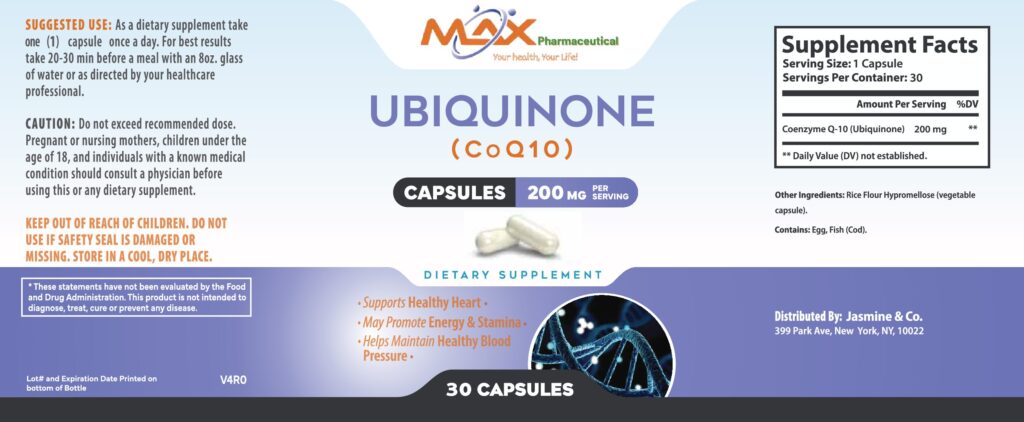
CoQ10
Coenzyme Q10
CoQ10, or Coenzyme Q10, is a naturally occurring antioxidant found in the body’s cells.
It plays a crucial role in energy production within the mitochondria, the powerhouse of the cell. CoQ10 is essential for the synthesis of adenosine triphosphate (ATP), which cells use for energy. This coenzyme also helps protect cells from oxidative damage by neutralizing free radicals.
CoQ10 levels can decrease with age, certain health conditions, and some medications. Because of its role in energy production and antioxidant properties, CoQ10 supplements are often used to support heart health, improve energy levels, and address conditions like high blood pressure, heart failure, and migraines.
In addition to its health benefits, CoQ10 is sometimes used in skincare products for its ability to reduce the appearance of wrinkles and improve skin texture by supporting cellular repair and protecting against environmental stressors.
Certainly! Here’s a more detailed overview of CoQ10:
Chemical Structure and Forms
- CoQ10 is a fat-soluble compound with a chemical structure similar to that of vitamins K and E. It exists in two primary forms: ubiquinone (oxidized) and ubiquinol (reduced). The body can convert between these two forms as needed. Ubiquinol is the active antioxidant form, while ubiquinone is involved in the production of energy.
Biological Role
- Energy Production: CoQ10 is crucial for the mitochondrial electron transport chain, a series of reactions that generate ATP, the primary energy currency of the cell. This process occurs in the inner mitochondrial membrane and is essential for the survival and function of all cells.
- Antioxidant Protection: CoQ10 helps protect cells from oxidative stress by neutralizing free radicals. Oxidative stress is linked to aging and various chronic diseases, including heart disease, cancer, and neurodegenerative disorders.
Health Benefits
- Cardiovascular Health: CoQ10 is commonly used to support heart health. It is believed to improve symptoms in conditions like heart failure, angina, and high blood pressure by enhancing energy production in heart cells and reducing oxidative damage.
- Neurological Health: Research suggests that CoQ10 may help slow the progression of neurodegenerative diseases like Parkinson’s and Alzheimer’s due to its role in protecting neurons from oxidative damage.
- Migraine Prevention: Some studies indicate that CoQ10 may reduce the frequency and severity of migraines, likely due to its effects on mitochondrial function and energy metabolism.
- Fertility: CoQ10 has been studied for its potential to improve sperm quality and egg quality, possibly enhancing fertility. It supports energy production in reproductive cells and protects them from oxidative damage.
- Exercise Performance: CoQ10 is sometimes used to improve exercise performance by increasing energy production and reducing fatigue. Athletes and those engaging in intense physical activity may benefit from supplementation.
Sources of CoQ10
- Dietary Sources: CoQ10 is found in small amounts in a variety of foods, particularly in organ meats like heart, liver, and kidney, as well as in beef, soy oil, sardines, mackerel, and peanuts. However, dietary intake may not be sufficient to significantly raise blood levels, especially in individuals with certain health conditions.
- Supplementation: CoQ10 supplements are widely available and often used to increase levels in the body. They come in various forms, including softgels, capsules, and powders. The bioavailability of CoQ10 can vary depending on the form and formulation, with ubiquinol being more easily absorbed than ubiquinone.
CoQ10 Deficiency
- Causes: CoQ10 deficiency can be caused by aging, certain genetic mutations, chronic diseases (such as heart disease, diabetes, and cancer), and the use of statin drugs (which reduce cholesterol levels by inhibiting the same pathway that produces CoQ10).
- Symptoms: Symptoms of CoQ10 deficiency may include fatigue, muscle weakness, cardiovascular issues, and neurodegenerative conditions. Supplementing with CoQ10 can help alleviate these symptoms.
Safety and Side Effects
- General Safety: CoQ10 is generally considered safe with few side effects. It is well-tolerated by most people, even at high doses. However, some individuals may experience mild gastrointestinal symptoms such as nausea, diarrhea, or appetite loss.
- Drug Interactions: CoQ10 may interact with certain medications, including blood thinners like warfarin, potentially reducing their effectiveness. It’s essential to consult with a healthcare provider before starting CoQ10 supplementation, especially if you are on medication or have a chronic health condition.
Research and Future Directions
- Ongoing Studies: Research on CoQ10 continues to explore its potential benefits in various conditions, including cancer therapy support, diabetes management, and its role in aging and longevity. Emerging studies are investigating its effects on skin health, cognitive function, and as an adjunctive treatment in various chronic conditions.
CoQ10 remains a popular supplement due to its wide-ranging health benefits and essential role in cellular energy production and protection against oxidative stress.
